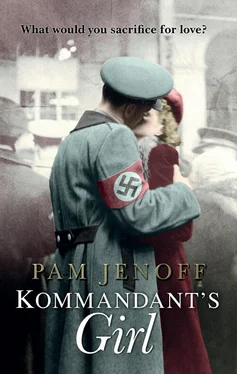At the bus stop I wait without speaking beside an elderly woman carrying an assortment of garden herbs in her tattered basket. The bus arrives and I follow the woman aboard, passing one of the tokens Krysia has given me to the driver. The bus rumbles along the unevenly paved road, pulling over every half kilometer or so. The trees, bent toward the road with their heavy loads of leaves, brush the roof of the bus as it passes. When all of the seats are filled and still more passengers continue to board, I stand to give my place to an old man, who smiles toothlessly at me.
Twenty minutes later, I step off the bus and, after a short walk, find myself standing at the foot of Wawel Castle. Looking up at the enormous stone fortress, I inhale sharply. I have not seen Wawel since I went to the ghetto last autumn. Now as I approach, its domes and spires seem even grander than I remembered. For the centuries that Kraków had been the capital of Poland, Wawel was the seat of kings, and many royal figures were buried in its cathedral. The actual capital had long since moved to Warsaw, and Wawel had become a museum—until eight months ago when it became the seat of the Nazi General Government. Compose yourself, I think, but my legs tremble and threaten to give out from under me as I walk up the long stone entranceway to the castle.
“Anna Lipowski,” I manage to say to the guard at the top of the ramp. He does not look at me, but checks my name off a list and summons a second guard, who escorts me into the castle through a stone archway. We proceed through a dizzying array of high-ceilinged hallways and marble staircases. The musty odor reminds me of the time when I visited the castle on a school trip as a child. But this is not the Wawel Castle of my childhood. The corridors are sterile now, the pictures of Polish kings removed. They are lined instead with endless red flags, each bearing a white circle with a large black swastika inside. Almost everyone we pass wears a Nazi military uniform and greets with a crisp, firm, “Heil Hitler!” I nod, unable to return the greeting. My escort, perhaps taking my silence as nervousness, answers loudly enough for both of us.
When at last it seems that we can walk no farther or higher, the guard stops before an enormous oak door bearing a plaque with Kommandant Richwalder’s name on it. He raps sharply on the door twice, then, without waiting for a response, opens it and gestures for me to enter. The room is a reception area of some sort, windowless and too warm. A large-boned woman with a wide nose and bad skin sits at a small desk in the center of the room. Her head is bowed and her enormous brown coil of hair bobs as she works, filling in spaces on a lined graph with intensity. If she’s here, I wonder, then what am I to do? Hope rises within me. Perhaps some mistake has been made and there is no position available for me. Maybe I can just go home. But even as I think this, I know that it is impossible; Kommandant Richwalder is not the type of man to make that sort of mistake.
I stand awkwardly by the door for several minutes. The woman does not look up. Helplessly, I turn around, but the guard who escorted me has disappeared into the hallway, leaving me alone. The woman behind the desk does not speak. “Przepraszam …” I finally say, excusing myself.
“Ja?” she replies, and I can tell from her pronunciation that she does not speak German.
“I am Anna Lipowski.” There is no reaction or response. “Kommandant Richwalder instructed me to report here….”
“Oh, yes.” At last she stands, inspecting me from head to toe with a sweeping glance. “You are the Kommandant’s new personal assistant.” There is an inscrutable hint of disdain in the way that she pronounces my job title that makes me uneasy. She gestures for me to follow her through a second door behind her desk. “This is the anteroom.” I look around. The room is smaller than the reception area, but has nicer furnishings and a cool breeze coming from two large open windows on either side. “You will work here. The Kommandant’s office is through that door.” She waves her head in the direction of another door at the back of the room. “The Kommandant had a meeting this morning and apologizes for being unable to welcome you personally.” It is hard to imagine the imposing Kommandant apologizing for anything.
The woman continues on as though giving a speech. “We are privileged to be working in the governor’s executive offices. Only the most senior officials and their staffs are located in Wawel. The rest of the General Government is located in the administrative building across town on Pomorskie Street.” I nod, trying to reconcile myself to the idea that working for the Nazis could somehow be construed as a privilege. “The Kommandant is the governor’s first deputy. All of the various directorates in southern Poland report to him. He will explain your duties to you in greater detail when he returns. For a start, you will keep his calendar and answer his correspondence.” She pronounces the word correspondence as though it were a matter of national security. “I am Malgorzata Turnau,” she concludes. “If I can help you at all, please let me know.”
“Thank you.” I realize then that this woman’s position is subordinate to mine, and the strange look I saw cross her face when she said my job title was one of jealousy. She probably hoped to move up to the very position I am to fill. But any sympathy I might have had for her is dampened by the reverence with which she described our work and the fervent look in her eyes. She is obviously one of those Poles whose loyalties have been swayed to the Nazis, and I can tell right away she will do anything to curry favor with the Kommandant. When Krysia had said to trust no one, she clearly had the Malgorzatas of the world in mind. I knew she would be watching me.
Malgorzata walks over to the desk that sits to the left side of the room under one of the windows. “This is the Kommandant’s mail.” She picks up a clipboard and hands it to me. “Open each piece and log it on this chart by sender, date and subject.” She shows me then how to separate the mail into piles: one for those pieces of correspondence that require the Kommandant’s personal attention, another for those that can be answered with a form response, and a final stack for those that need to be routed to other offices. “And don’t open anything marked confidential,” she instructs before leaving the room, slamming the door behind her.
Alone, I exhale, sitting down behind the desk. In addition to the letters, there is a small stack of office supplies that has been left on the desk for me, which I organize and place in the drawers. I pause to look around my new quarters. The anteroom is about three by five meters, with a small sofa located across from the desk. The windows, one each over the desk and sofa, are almost too high to see out of, but if I raise myself on my toes, I can just catch a glimpse of the river.
I reach for the stack of mail and begin opening the envelopes. Remembering what Krysia had said, I try to read as much of it as possible, but it is remarkably mundane, mostly invitations to social functions and dry-looking, official reports comprised of German military terminology that I cannot comprehend. About a third of the way down the stack, there is one envelope emblazoned with the word Confidential in red ink across the seal. I pull it out and hold it up to the light, but it is impossible to see through the thick paper. I examine the seal of the envelope. Perhaps I can open it and then close it again, I think, working at the edge of the seal with my fingernail.
The door swings open. I look up. The Kommandant strides into the anteroom, cloak flung over one shoulder. My breath catches. He is even more striking than I remembered. A smaller man, also in uniform, follows him, carrying two black leather briefcases. I rise to my feet. “Anna,” the Kommandant says, smiling and walking toward me. He takes my right hand and I half expect him to kiss it as he did the night we met at Krysia’s, but instead he simply shakes it in a businesslike manner. “Welcome.” He gestures to the other man. “This is Colonel Diedrichson, my military attaché.”
Читать дальше












